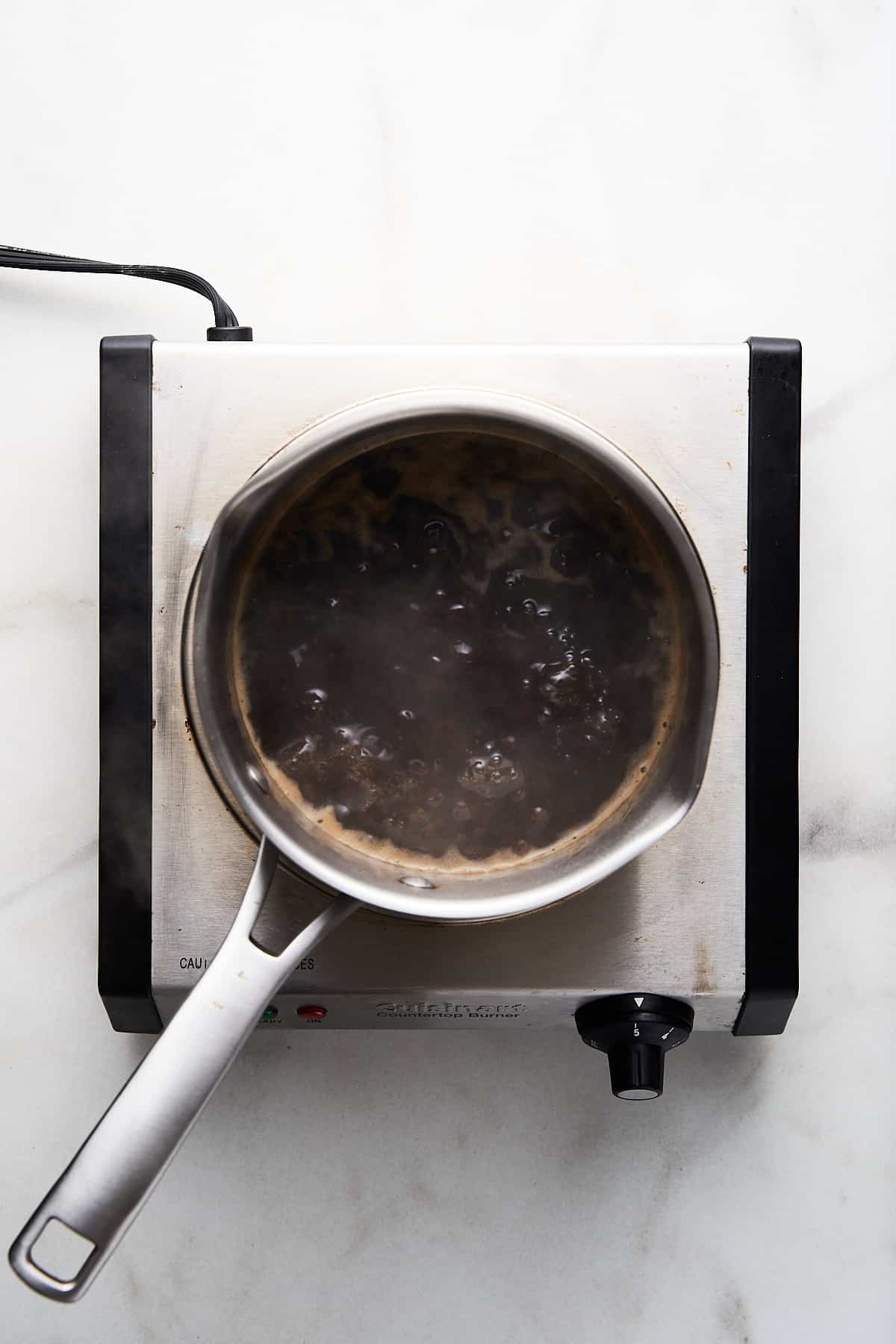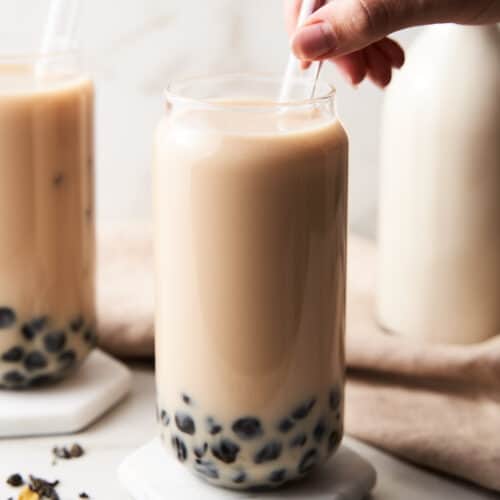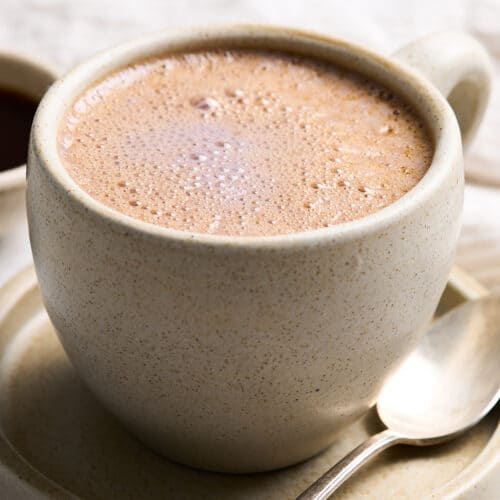Honeydew Milk Tea
This honeydew milk tea is a refreshing, vibrant drink that’s both easy on your wallet and simple to make! With a base of ripe melon, green tea, and plant milk, it’s the perfect way to cool down during the summer months.

With just a handful of ingredients and no fancy equipment required, you can enjoy a tea shop-quality beverage from the comfort of your home. As with my taro milk tea, this honeydew tea has a beautiful hue and uniquely fruity flavors you’ll love!
Why I love this recipe
Honeydew milk tea is my go-to when I want a sweet, tropical, and creamy drink to cool off with. Made with just a few ingredients, like ripe melon, plant milk, and chewy tapioca pearls, it’s a budget-friendly way to satisfy your boba cravings at home.
All you have to do is steep some green tea, then blend it with honeydew cubes, simple syrup, plant milk, and a touch of matcha for color.
Serve it over freshly cooked tapioca pearls for the most refreshing milk tea ever! If you love boba and are looking for a twist on classics like oolong milk tea, this flavor is perfect!
Ingredient notes
You only need 6 ingredients for this honeydew milk tes! Find a full breakdown and suitable substitutes below.

Honeydew
It’s common to use honeydew powder, but I prefer fresh melon for this bubble tea. Make sure your honeydew is nice and ripe for an extra sweet and delicious flavor.
Green tea
The earthiness of green tea complements the light and refreshing honeydew. Loose-leaf or green tea bags both work, but do not let it steep for more than 2-3 minutes to prevent a bitter taste.
Substitute: You can also try other teas like jasmine green, oolong, black, or herbal. There is even honeydew-flavored green tea available nowadays.
Plant milk
My preferred choices for honeydew milk tea are soy, coconut, or oat milk. If you prefer a thinner consistency, use almond or rice milk.
Tapioca pearls
Tapioca pearls, or boba, are available at any Asian food market. Uncooked tapioca pearls can be purchased online, or you can use quick-cooking boba to save time. Just note that the texture and flavor won’t be quite as good with quick-cooking boba.
Sweetener
Cane sugar sweetens both the tapioca pearls and the tea itself, balancing the bitterness of the tea and the mild flavor of the honeydew.
Substitute: Try beet sugar, brown rice syrup, or date sugar instead. Or, use a sugar-free sweetener like stevia or monk fruit. You can also leave out the sugar if you have an extra-ripe honeydew.
Matcha
I add a scoop of matcha mainly for color and subtle earthy flavors. If possible, source ceremonial-grade matcha for the best flavor and health benefits. Matcha is optional, but I love it because it contains brain-healthy nutrients like L-theanine.
For a complete ingredient list and step-by-step guide, scroll down to the recipe card.
How to make
Learn the best way to make honeydew milk tea with my straightforward, easy-to-follow instructions. Look for the tips in green throughout this section for consistent and successful results!
Preparation
Wash the honeydew melon thoroughly, then peel and cut it into cubes. Bring water to just under a boil (175-180 degrees Fahrenheit), then brew the green tea for 2-3 minutes before removing the leaves and letting the tea cool.
To prevent a bitter honeydew milk tea, don’t steep the tea past 3 minutes.
Cooking
Step 1
In a medium-large saucepan, bring water to a boil. Once it’s boiling, add the tapioca pearls and lower the heat to just under medium. You don’t want to overcook them. Simmer the boba for 15-30 minutes, stirring occasionally to prevent sticking.
The total cooking time will depend on the specific type of pearls you’re using, so make sure to check the package for instructions. For reference, mine took 30 minutes, but quick-cooking boba usually take 5 minutes.

Step 2
In the meantime, whisk the cane sugar and more water in another small saucepan. Bring the mixture to a simmer for a few minutes until the sugar fully dissolves. Remove the saucepan from the heat and reserve a few tablespoons, then add the rest to a medium mixing bowl.

Step 3
When the tapioca pearls are cooked, strain them through a fine-mesh strainer, rinsing them lightly. Transfer the pearls to the mixing bowl with the syrup and stir to combine. Set the bowl aside to soak while you make the honeydew milk tea.

Step 4
Add the honeydew cubes to a blender, followed by the brewed tea, matcha, plant milk, and 3 tablespoons of simple syrup. Blend it together for about 60 seconds until smooth, then taste and adjust the sweetness to your preference.


Step 5
Strain the honeydew mixture through a fine-mesh strainer for a smoother drink. If you don’t mind a few little bits of melon, skip this step!

Step 6
Using a slotted spoon, add a few tablespoons of tapioca pearls to a serving glass. Add a handful of ice, then fill the rest with the blended honeydew milk tea mixture. Give it a stir before serving. Happy drinking!

Expert tip
The quality of your honeydew has a significant impact on the overall flavor and texture of the drink, so it’s important to use ripe, sweet honeydew for the best results.
Make sure the melon feels heavy for its size. Avoid melons with bruises, cracks, or soft spots, and look for a dull rind.
Knock on the melon and listen for a deep hollow sound. The melon should also have a sweet smell, which indicates it’s ready to be made into honeydew milk tea!
Cooking tips
Prep in advance: To make things quicker, prepare the simple syrup and tea a few hours in advance so they have time to cool.
Use fresh pearls: For the softest and chewiest boba, use cooked tapioca pearls right away. When they cool, they start to harden again.
Bubble tea straw: If you are serving your honeydew milk tea with boba, use a wide-mouth straw made for bubble tea. There are a lot of different materials to choose from, like bamboo and metal, but I like glass bubble tea straws.

Frequently asked questions
Honeydew milk tea only contains caffeine if the tea contains caffeine (e.g. green or black tea). This particular recipe contains caffeine, but you can use decaf tea, herbal butterfly pea tea, or more plant milk.
Tapioca pearls will become slightly translucent and have a chewy texture once they’re fully cooked. The center might have a tiny speck of uncooked starch, but overall, they shouldn’t feel hard.
Yes, frozen honeydew works well in this recipe. There’s no need to thaw it — blend it directly from frozen. Just note that you may need more liquid.
Storing
It’s best to consume the fully made honeydew milk tea immediately after it’s made since the tapioca pearls become less soft and chewy the longer they sit. However, you can store the components separately.
Fridge
Honeydew milk tea without boba can be stored in the fridge for up to 48 hours. The honeydew mixture should be placed in an airtight container, and the cooked tapioca pearls should be placed in a separate sealed container.
Freezer
I like to freeze extra milk tea without boba in ice cube trays. This way, I can use flavored ice in another honeydew milk tea or even this matcha latte!
More tea & coffee recipes
Hungry for more?
If you enjoyed this recipe, please consider leaving a star rating and a comment down below! Your feedback not only helps others discover our blog but also gives us valuable insights from your experience.
Don’t forget to subscribe to our newsletter for the latest recipes, and check out our shop for our top kitchen recommendations. Thank you for supporting BBV!
Recipe

Easy Honeydew Milk Tea (With Boba)
Equipment
- Teapot
- Medium saucepan
- Small saucepan
- Blender
- Boba straws
Ingredients
Boba
- ½ cup uncooked black tapioca pearls
- 6 cups water
- ⅓ cup cane sugar + ⅓ cup water
Green tea
- 2 cups filtered water
- 2 green tea bags
Honeydew mix
- 4 cups honeydew cubes
- 1 cup soy, coconut, or oat milk
- 1 teaspoon matcha optional
- 3-4 tablespoons reserved simple syrup
- Ice to serve
Instructions
Boba
- Bring the water for the tapioca pearls to boil in a medium-large saucepan. Once boiling, add in the tapioca pearls and lower the heat to just under medium.
- Simmer for 15-30 minutes, stirring occasionally to prevent sticking. Cook time will depend on your specific pearls (check the package for instructions).
- In the meantime, prepare the simple syrup. Add the cane sugar and water to a small saucepan and whisk together. Bring it to a simmer for about 3-5 minutes until the sugar fully dissolves. Remove the saucepan from the heat and reserve ¼ cup, then add the rest to a medium mixing bowl.
- Strain the tapioca pearls through a fine-mesh strainer, rinsing them lightly. Transfer the pearls to the mixing bowl with the simple syrup and stir to combine. Set aside for ~30-40 minutes to soak.
Green tea
- While the tapioca pearls are soaking, bring water for the tea to boil, then let it cool for a few minutes (it should be ~175-180°F). Brew the green tea for 2-3 minutes, then remove the bags and let the tea cool.
Honeydew
- Add the honeydew cubes to a blender, followed by the brewed tea, matcha, milk, and 3 tablespoons of simple syrup. Blend until smooth. Taste and adjust sweetness to your preference.
- Strain the honeydew mixture through a fine-mesh strainer for a smoother drink. If you don't mind a few bits of melon, skip this step!
- Using a slotted spoon, transfer 3-4 tablespoons of tapioca pearls to a glass or cup. Fill it ½ – ¾ full with ice, then add the rest with honeydew milk tea. Happy drinking!
Notes
Nutrition
Note: I’ve updated this post to include new information and helpful tips about the recipe.
Justine Drosdovech is a food writer, photographer, and one of the founders of Broke Bank Vegan. She is a self-taught plant-based chef but uses her healthcare background to craft dishes that are both delicious and nourishing.




